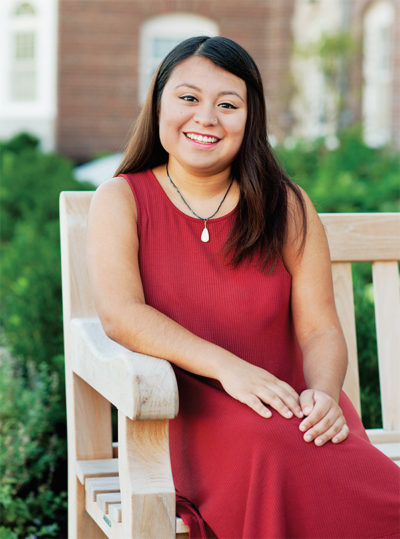When Tiffany Tapia ’17 came to Babson from her home in New York City, she felt as if she had traveled to another world. She wasn’t used to living in the suburbs and missed the fast pace of the city. As the first in her family to attend college, Tapia wasn’t prepared for the challenging academics, and she didn’t have the network of connections that other students relied on to help them advance.

Photo: Webb Chappell
Tiffany Tapia ’17
Tapia, the oldest of three daughters whose parents emigrated from Mexico, always knew that college would somehow be in her future because her mother continually stressed the importance of an education. “My mom wanted to go to college, but she didn’t have the financial means,” Tapia says. “She tells us that it’s a privilege, and that if we want to do well in life, get a good job, and be able to travel, we need an education.”
With hard work and help from a dedicated high school guidance counselor, Tapia found her way to Babson. Coming from a small, close-knit high school, Tapia was initially nervous. “I had no idea what to expect, and no one to turn to for advice,” she says.
Her first year, Tapia struggled to keep up with the fast pace of classes and doubted her ability to succeed. Then in 2014, Academic Services reached out to first-generation students to create the FirstGen@Babson group. Coming off a difficult semester, Tapia was excited to connect with students who had similar stories. The group provided academic support and advice, such as studying tips and how to prioritize time and save money on textbooks.
Although Tapia enjoyed the experience, she longed for a group that was more personal and addressed the concerns that first-generation students often face inside and outside the classroom. “You can’t tell by looking at someone’s appearance if they’re a first-generation student and what their needs are,” she says. Many struggle with issues such as pressure to support their families financially, feeling bad about leaving their families, and feeling compelled to take full advantage of the myriad opportunities available at college. They also can feel lost and lack the necessary support and guidance to tackle these problems on their own. Says Tapia, “I wanted to give them a voice and lead them to the resources they need to succeed.”
In response, she founded the Babson FirstGen Club. Now serving in her second year as president, Tapia notes that the club has about 80 members, holds at least one event each month, and is open to all students, both first-gen and allies. “First generation can mean a lot of different things,” says Tapia. “It can mean a student who is the first in their family to go to college, a student who is the first in their family to go to college in the U.S., or a student whose parents started college but didn’t finish. This club provides a safe space for all students to build support, networks, and friendships.”
Tapia hopes to build upon last year’s work of creating awareness for the club while expanding into new areas, such as identifying and engaging with first-generation alumni, faculty, and staff. She hopes to bring these individuals to campus to speak at meetings, and for them to become mentors for students as they navigate their college and post-college careers. “The first-generation experience is so unique,” she says. “I know we would all benefit from being able to talk with individuals who were able to succeed.”—Alexa D’Agostino
